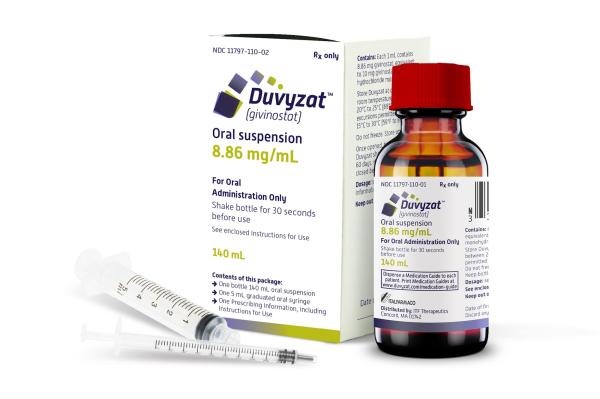Duvyzat Dosage
Generic name: GIVINOSTAT 8.86mg in 1mL
Dosage form: oral suspension
Medically reviewed by Drugs.com. Last updated on Mar 29, 2024.
Recommended Evaluation and Testing Before Initiation of DUVYZAT
Obtain and evaluate baseline platelet counts and triglycerides prior to initiation of DUVYZAT [see Warnings and Precautions (5.1, 5.2)]. Do not initiate DUVYZAT in patients with a platelet count less than 150 x 109/L. Monitor platelet counts and triglycerides as recommended during treatment to determine if dosage modifications are needed [see Dosage and Administration (2.3)].
In addition, in patients with underlying cardiac disease or taking concomitant medications that cause QT prolongation, obtain ECGs when initiating treatment with DUVYZAT, during concomitant use, and as clinically indicated [see Dosage and Administration (2.3), Warnings and Precautions (5.4), and Drug Interactions (7.2)].
Recommended Dosage
The recommended dosage of DUVYZAT is based on body weight and administered orally twice daily with food (see Table 1) [see Dosage and Administration (2.4)].
| Weight* | Dosage | Oral Suspension Volume |
|---|---|---|
|
||
| 10 kg to less than 20 kg | 22.2 mg twice daily | 2.5 mL twice daily |
| 20 kg to less than 40 kg | 31 mg twice daily | 3.5 mL twice daily |
| 40 kg to less than 60 kg | 44.3 mg twice daily | 5 mL twice daily |
| 60 kg or more | 53.2 mg twice daily | 6 mL twice daily |
Dosage Modifications for Adverse Reactions
Decrease in Platelets, Diarrhea, Increase in Triglycerides
DUVYZAT may cause adverse reactions [see Warnings and Precautions (5.1, 5.2, 5.3)], which may necessitate a dosage modification (see Table 2) if the following occur:
- Platelet count <150 x 109/L verified in two assessments one week apart
or - Moderate or severe diarrhea
or - Fasting triglycerides >300 mg/dL verified by two assessments one week apart
Based on the severity of these adverse reactions, treatment interruption prior to dosage modification should be considered.
| First Dosage Modification* | Second Dosage Modification† | |||
|---|---|---|---|---|
| Weight‡ | Dosage | Oral Suspension Volume | Dosage | Oral Suspension Volume |
| 10 kg to less than 20 kg | 17.7 mg twice daily | 2 mL twice daily | 13.3 mg twice daily | 1.5 mL twice daily |
| 20 kg to less than 40 kg | 22.2 mg twice daily | 2.5 mL twice daily | 17.7 mg twice daily | 2 mL twice daily |
| 40 kg to less than 60 kg | 31 mg twice daily | 3.5 mL twice daily | 26.6 mg twice daily | 3 mL twice daily |
| 60 kg or more | 39.9 mg twice daily | 4.5 mL twice daily | 35.4 mg twice daily | 4 mL twice daily |
QTc Interval Prolongation
Withhold DUVYZAT if the QTc interval is > 500 ms or the change from baseline is > 60 ms [see Warnings and Precautions (5.4) and Drug Interactions (7.2)].
Preparation and Administration Instructions
See the Instructions for Use for further details.
- Before use, shake the DUVYZAT suspension for at least 30 seconds by inverting the bottle by 180°.
- Visually verify the homogeneity of the suspension.
- Using a graduated oral syringe, measure the appropriate volume of suspension corresponding to the prescribed dose of DUVYZAT.
- Administer orally with the provided graduated oral syringe.
Frequently asked questions
More about Duvyzat (givinostat)
Patient resources
Professional resources
Related treatment guides
Further information
Always consult your healthcare provider to ensure the information displayed on this page applies to your personal circumstances.


